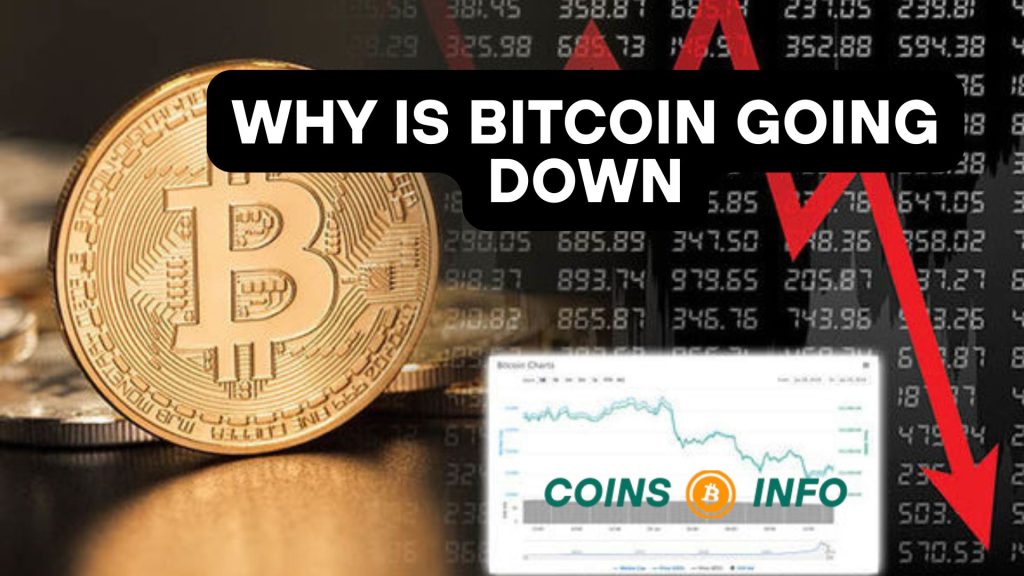Bitcoin Going Down: The first and most popular cryptocurrency in the world, Bitcoin, is notoriously volatile. In a few days, it can rise to new all-time highs and fall just as fast. A common question among traders, investors, and spectators is: Why is Bitcoin declining? Price decreases can be caused by a variety of market, economic, regulatory, and psychological variables rather than just one. Below is a summary of some of the most frequent reasons.
Macroeconomic Pressures.
The global macroeconomic climate is one of the most significant factors influencing the price of Bitcoin. Risky investments, such as Bitcoin, frequently suffer when interest rates rise, particularly in the US. To combat inflation, central banks worldwide, particularly the US Federal Reserve, have raised interest rates since 2022. Higher interest rates increase the cost of borrowing and lower the financial system‘s liquidity.
Because less liquidity results in fewer funds being allocated to speculative investments, this is significant for Bitcoin. Investors frequently transfer their money to government bonds or other safer, income-producing investments. Because of this, there is less demand for Bitcoin, which lowers its price.
Market Sentiment and Fear.
Bitcoin is quite sensitive to the mood of the market. Investors frequently panic-sell their holdings when fear enters the market, whether as a result of economic uncertainty, geopolitical turmoil, or regulatory rumors. Retail investors, who frequently have emotional reactions to short-term news, also control a large portion of the cryptocurrency market.
Extreme fear is frequently linked to steep drops in the price of Bitcoin, according to tools like the Crypto Fear & Greed Index. Bitcoin’s price is more susceptible to emotional swings than traditional stock markets, which might be maintained by institutional investors and long-term strategy.
Regulatory Crackdowns.
Globally, governments and banking authorities are still debating how to deal with cryptocurrencies. The market responds adversely to news of tighter rules, such as prohibitions on cryptocurrency trading, limitations on mining, or threats of prosecution against significant exchanges.
For instance, the network’s rate has drastically decreased, and the price of Bitcoin fell in 2021 when China outlawed the mining of the cryptocurrency. Similar to this, any enforcement steps taken by U.S. regulators, including lawsuits brought against large exchanges by the Securities and Exchange Commission (SEC) or the designation of specific tokens as securities, tend to instill fear and uncertainty in the market.
Profit-Taking and Whale Movements
When “whales,” or large Bitcoin holders, decide to sell, they have the power to drastically alter the market.
Particularly in situations involving leveraged trading, when whales sell off substantial quantities of Bitcoin, it may trigger a chain reaction of automated sell orders and liquidations. This intensifies the price decline and starts a brief negative cycle.
Exchange or Institutional Issues
Events in the cryptocurrency ecosystem can occasionally cause market shocks, a significant decline in Bitcoin, and a general market mood resulting from the 2022 collapse of FTX, which was formerly one of the biggest cryptocurrency exchanges.
Similarly, it might cast doubt on the state of the market as a whole if a prominent institutional backer of cryptocurrency initiatives withdraws or runs into financial difficulties.
Technical Corrections.
The price of Bitcoin does not rise in a straight line. Following large bull runs, the market frequently experiences a period of correction, which can be healthy for long-term growth but frequently causes short-term panic. For instance, if Bitcoin rallies 100% over a few months, a pullback of 20–30% is not unusual. Technical traders and algorithms also look at key support and resistance levels; if Bitcoin breaks below these levels, it may lead to further selling.
Media Narratives and Hype Cycles.
Because of its popularity, the media frequently discusses Bitcoin. While negative publicity might have the opposite impact, positive news reports can increase prices and cause FOMO (fear of missing out). Reports about fraud, illegal Bitcoin use, or mining-related environmental issues can all push the price lower.
